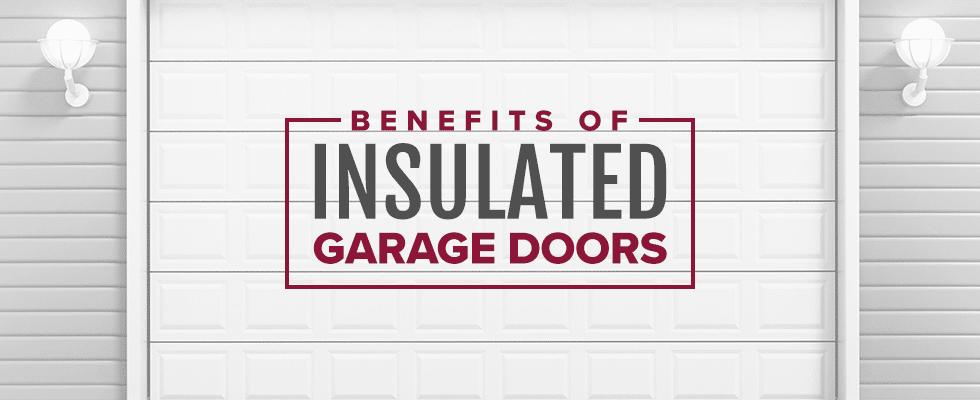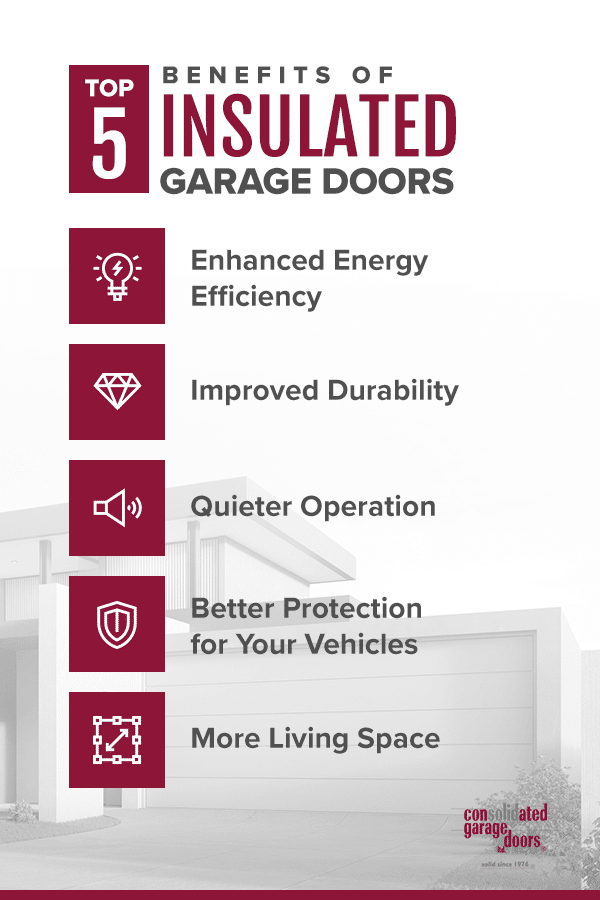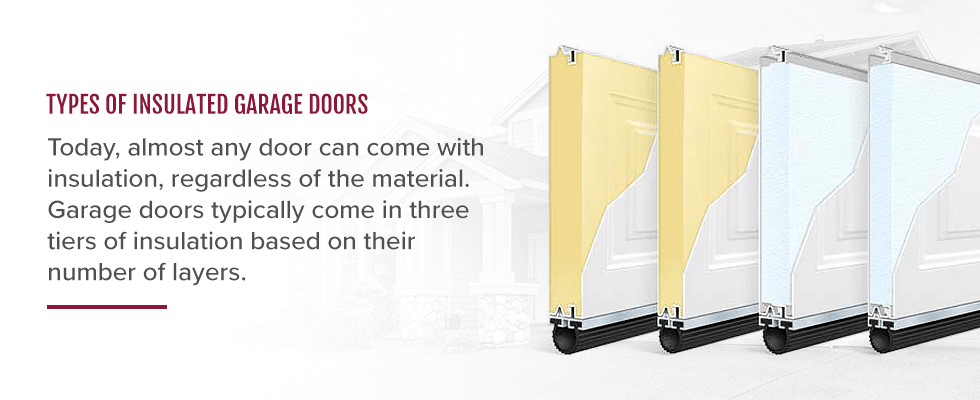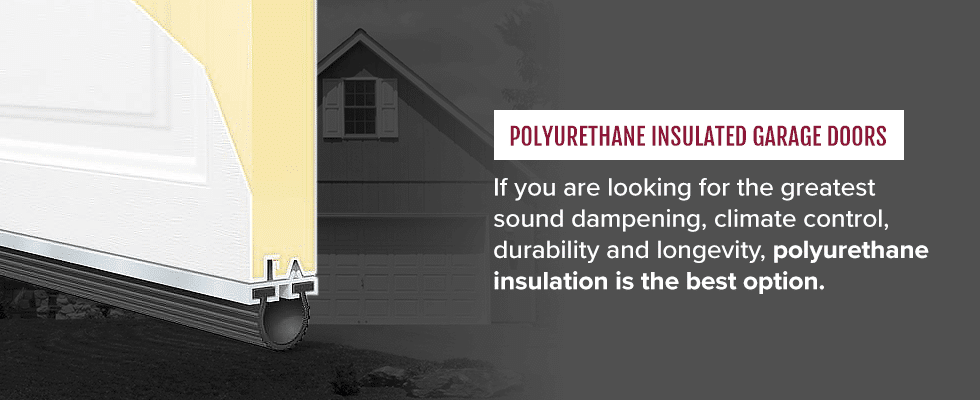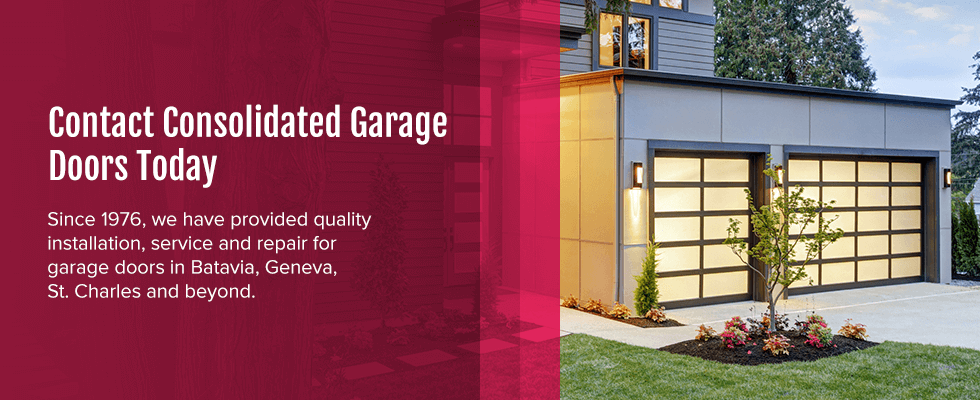Is it time to get a new garage door? Whether you’re replacing the door for functional reasons or because you want to give your home an updated look, having a new garage door installed is one of the best ways to add value to your home. One nationwide study revealed that garage door replacement returns 94.5% of the money invested.
Before you choose a type and material, you’ll need to decide if you should insulate your garage door. In this guide, we’ll discuss the benefits of insulated garage doors and the factors you’ll need to consider before purchasing.
Top 5 Benefits of Insulated Garage Doors
First, let’s consider the most significant benefits of insulated garage doors:
1. Enhanced Energy Efficiency
If you look for advice on how to conserve energy, you’ll typically find a long list of tips you can apply to the interior of your home. Many don’t consider the garage as part of the home because it’s not typically used as a living space.
However, garages are commonly attached to the house and have conditioned rooms on the other sides of the walls. Therefore, the temperature conditions in the garage can spread to these other rooms and alter how hot or cool your home is, resulting in more energy usage. A poorly insulated garage makes your house hotter in the summer and colder in the winter, increasing the burden on your HVAC system and raising the cost of your bills.
While proper insulation in the walls is important, it doesn’t do much good if the garage door itself isn’t insulated. An insulated garage door minimizes temperature fluctuation from air leaks and gaps, keeping the space a steady temperature and improving thermal efficiency.
But, will an insulated garage door make a difference even if the rest of the garage isn’t insulated? Data from garage door manufacturer Clopay shows just how effective an insulated garage door can be — engineers measured the temperature of an uninsulated garage with outdoor temperatures of 20 degrees Fahrenheit. With a single-layer uninsulated door, the garage was about 30°F. When they installed an insulated door, the garage was a much warmer 42 degrees Fahrenheit.
2. Improved Durability
When choosing a garage door, you want to select one that will last through the years without denting at the slightest impact. Single-layer garage doors offer little in the way of durability, while the layers used in the manufacture of insulated garages provide a much more rigid final product.
Today’s insulated garage doors start with an aluminum or steel frame, which is then filled with solid core insulation. This core then fits between steel panels, which can be made of a single or double layer. This type of manufacturing allows the door to remain lightweight but greatly increases its ability to withstand dents.
Older garage doors are frequently constructed with a single layer of thin steel applied to the frames. If there is no insulation, the interior of the door is essentially hollow and gives no resistance to impact from cars, bikes and balls.
3. Quieter Operation
Garage doors can be very noisy. If you’re used to it, you might not notice the clanging when the door opens and closes, but if you frequently use the door early in the morning or late at night, there’s a good chance your neighbors are aware of the sound. Noise reduction by choosing an insulated garage door can increase the feeling of peace and quiet within your home.
Some issues with noise can be solved by ensuring timely maintenance to lubricate hinges and springs and tighten loose track chains. However, a noisy garage door may be the result of the panels vibrating against the frame. In this case, the noise can’t be fixed by maintenance.
An insulated garage door is heavier and provides less room for panels to rattle against the frame, making it far less noisy than a non-insulated door.
4. Better Protection for Your Vehicles
The main purpose of most garages is to protect one or more vehicles from the elements. However, a garage without an insulated door can leave your car in freezing conditions. Having trouble starting your car because it’s freezing can be a serious annoyance, but keeping a car in frequent cold conditions can actually damage it over time. Some of the issues that can occur in cold weather include:
- Reduced battery life and dead batteries.
- Thickening of fluids for the transmission, brakes and engine.
- Low air pressure or flat tires.
- Reduced reliability of electrical systems.
Are insulated garage doors worth it for the protection of your car? The results of the Clopay experiment with insulated vs. non-insulated garage doors prove that an insulted door can help maintain a more stable garage temperature, protecting your vehicle from freezing temperatures.
5. More Living Space
Many people do more than just park their car in the garage space. Insulated garage doors will help you maximize the use of that space. If you have a two-car garage and only one car, for example, there is likely ample space you could use for a variety of activities. You could use the extra space to set up a home gym or a messy crafts project.
If you ever heat or cool your garage or want to use it as a living, working or play space, choosing an insulated door is a must, as it narrows the temperature range, so you can do more activities comfortably.
Request an Estimate Click to Call
What Is R-Value?
How can you tell which doors provide the best insulated properties? In most cases, you’ll be comparing R-values, as they are currently the most common way to quantify insulation properties.
An R-value measures how effective a material is at insulating the garage door, based on the amount of heat it loses. R-values are calculated with a number of factors, including chemical properties and the thickness of the insulation material. The higher a door’s R-value, the less heat that passes through it.
It’s important to note that the type of garage door insulation used affects the R-value independently of thickness. For example, a door that has 2-inch thick polyurethane may have a different R-value than a door constructed with 2-inch thick polystyrene.
What Is U-Factor?
Although it’s less common, you may come across doors that offer a U-factor in place of an R-value. A U-factor rating considers the whole door assembly. This includes everything from the frame to the panels and finishing hardware. U-factor measures heat transfer properties of material just like R-value, but it is rated on a scale of zero to one. As an additional difference, lower U-factors are more desirable. A garage door with a U-factor of 0.25 will provide better insulation and efficiency than one with a U-factor of 0.50.
Types of Insulated Garage Doors
Materials play a large role in how your garage door makes your home look. Fortunately, you have a wider selection of materials to choose from than ever before. Today, almost any door can come with insulation technology, regardless of the material. Garage doors typically come in three tiers of insulation based on their number of layers:
- Single-layer doors have one layer of one material and provide no other insulation.
- Double-layer doors have a layer of insulation in addition to the main material.
- Triple-layer doors have thicker insulation and an extra layer, making them the most efficient.
Be aware that choosing a single-layer door leaves you with only the insulation provided by the panel material, and no material by itself is an effective insulator. By selecting a double or triple-layer garage door, the insulation material inside it will do most of the heavy lifting, so you can pick a finish that suits your aesthetic desires rather than focusing on the material’s insulating properties.
So, how much do insulated garage doors cost? The price of an insulated garage door can vary greatly, depending on the material, size specifications, number of layers, model, finishing hardware and more.
To compare the various types of insulated garage door materials, you need to first understand the pros and cons of each. Here are some of the most common types of doors:
1. Aluminum Doors
Aluminum is the most lightweight material available for garage doors, but it also provides the least insulating power. However, when combined with one or more layers of insulation, aluminum doors can be affordable and better at keeping your garage at a proper temperature.
The Avante line-up of aluminum and glass doors is a popular way to update your home on a budget. It offers significant customization in terms of color and has options for glass windows to give your garage more natural lighting. While this model does not offer insulation in the panels, you can opt for insulated glass panels to improve efficiency.
2. Steel Doors
Steel is the most common material you’ll find when searching for a new garage door. It has relatively low maintenance needs, comes in an immense variety of styles and is reasonably durable. Its insulation properties are moderate, but it’s easy to find multi-layer doors to increase efficiency. Here are some of the steel doors you’ll find in our collection:
- Modern Steel: These doors come in a wide variety of looks and can be constructed as single, double or triple-layer door. R-values on insulated Modern Steel doors range from 4.4 to 18.4.
- Gallery Collection: This upscale collection of carriage house doors offers a vintage feel that works on a variety of home styles and offers multiple insulation options that provide R-values of 6.3 to 18.4.
- Classic Collection Premium: If you prefer the simple look of a traditional raised-panel door, this collection delivers with a range of design options to choose from. R-values range from 6.3 to 18.4.
3. Wood Doors
Homeowners typically choose wood doors for their classic upscale looks. Although wood alone does not provide great insulation, it is mostly used in high-end doors that offer double or triple layers. Clopay offers multiple wood options designed with insulation in mind:
- Modern Series: This collection blends contemporary with classic in a four-layer construction with polystyrene insulation. The Modern series combines wood with an aluminum frame. The R-value of this series is 5.9.
- Limited Edition Series: This door series is made from sustainable sources for carriage house doors that give your home a warm, inviting look. This collection comes in both four or five-layer variations, also providing an R-value of 5.9.
- Custom Series: There’s nothing like bringing your very own design dream to life, and Clopay’s Custom series makes it possible. You can choose from gorgeous woods like African Mahogany, Spanish Cedar and Ironwood, all available in four or five-layer construction. Like other Clopay wood doors, the custom series offers an R-value of 5.9.
No matter what combination of qualities you’re looking for in a garage door, Clopay can make it happen.
Polystyrene vs. Polyurethane Insulated Garage Doors
There are two types of garage door insulation: polystyrene and polyurethane. Here are some of the advantages of each:
Polystyrene
Polystyrene is the less expensive insulation option, which makes it more common than polyurethane insulation. Can an existing garage door be insulated with polystyrene? The manufacturing style makes it simple to add to the separate sections of door paneling. Polystyrene comes in sheets, and individual panels are cut out for application to the door.
Polystyrene is waterproof and, of course, comes in varying thicknesses. While polystyrene is an affordable option that provides some sound dampening and better efficiency than a non-insulated door, it is not as effective as polyurethane.
Polyurethane
Polyurethane is a denser material than polystyrene, making it more a more expensive option. However, the insulation that polyurethane provides justifies the price. This material is much stronger than polystyrene due to its application.
Polyurethane foam is injected between the steel or aluminum layers of the door, ensuring all openings and cracks are completely filled. The foam expands as it is applied, bonding to the garage door. This property is instrumental in making your door more durable and resilient, decreasing the chances of denting under light impact.
If you are looking for the greatest sound dampening, climate control, durability and longevity, polyurethane insulation is the best option.
Contact Consolidated Garage Doors Today
Whether you’re looking for a new insulated garage door or want to add insulation to an existing door, Consolidated Garage Doors is your source for professional service in Illinois. Since 1976, we have provided quality installation, service and repair for garage doors in Batavia, Geneva, St. Charles and beyond. We are proud to follow the International Door Association (IDA) Code of Conduct, giving our customers world-class service backed by years of expertise in the industry.
To learn more about our insulated garage doors and request a quote, fill out our online contact form. You can also reach us at 630-761-1976 for more information.


